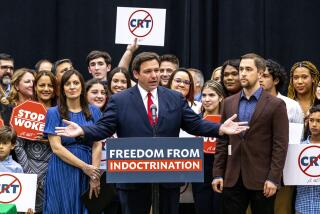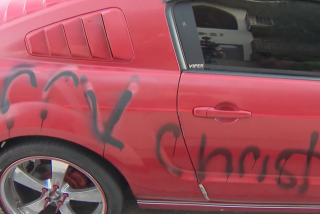A Wapner Decision : Santa Paula: The famed ‘People’s Court’ judge fines a businessman $600 for marring controversial protest signs.
- Share via
Six years ago, Santa Paula resident Ray Gonzales went to the 2nd District Court of Appeal to protect the controversial protest signs he had parked on city property.
But when it came time to settle his claim against Santa Paula businessman John Wisda for vandalism of those signs, Gonzales went to an even higher court, at least in terms of Nielsen ratings.
Under the glare of “People’s Court” television lights, Wisda, 44, was fined $600 this week by Judge Joseph Wapner, who ruled that he had violated Gonzales’ First Amendment rights of free speech.
The “People’s Court” appearance marks the latest episode in a long-running dispute between Gonzales and the city of Santa Paula. The signs, which protest local government officials and their allegedly elitist policies, have become Santa Paula landmarks.
For Wisda and other business owners, the signs, located on 10th Street near Veterans Memorial Park and in front of City Hall, foster a negative image of the community.
For Wapner, the issue was clear: Wisda had no right to infringe on the expression of Gonzales’ opinions. At one point the often-cantankerous Wapner dressed down Wisda for pleading the Fifth Amendment as to whether he defaced more than one sign.
Wisda admitted he wrote “Happy New Year” on one of the signs, and Wapner ruled that Wisda drew Christmas trees. The signs often attack specific council members and accuse city fathers of discriminating against Latinos.
Wisda said he learned a lesson from his “People’s Court” appearance. “Ray Gonzales does have the right to put up those signs,” he said after the court appearance. “I was wrong.”
While the “People’s Court,” a popular television show, will pick up Wisda’s fine, Judge Wapner’s ruling is legally binding. The episode is scheduled to air sometime this fall.
“I have been fighting City Hall for over 10 years, protesting the double standard for Mexican-Americans here,” Gonzales, 43, said. Gonzales said he was happy with the ruling, but that money was not the issue. “If I had been an Anglo, this would not have taken 10 years.”
Wisda and Gonzales initially went to small claims court in a dispute over the value of the defaced signs. Wisda had already lost in Municipal Court on defacement charges. The staff of “People’s Court” noticed the case and asked the litigants to appear on the show.
Gonzales parked the signs in pickup trucks after his primarily Latino service club, the 20/30 Club, was banned from maintaining a beer booth at the Kiwanis-sponsored Citrus Fair in 1984.
Gonzales claims the predominantly white Kiwanis club forced his club out of the fair. For him, the signs are a protest against the disenfranchisement of Mexican-Americans in Santa Paula. In 1986 the city passed an ordinance outlawing “temporary signs,” but Gonzales managed to have it overturned by the 2nd District Court of Appeal.
The signs have been the target of multiple defacements, Gonzales said, many carrying racist messages. He has also received anonymous phone threats and has been the target of racist hate mail, which spurred an inconclusive FBI investigation in 1989.
Wisda said he only meant to foster a positive attitude with his New Year’s message. “I did not do this out of bigotry,” he said. “Those signs are so negative. I wanted to start the New Year with a positive message.”
Wisda has offered a resolution to the long-simmering conflict: Gonzales removes the signs and the City Council gives back the beer concession, with no strings attached. An earlier negotiation effort broke off when Gonzales balked at a clause requiring he never display another sign.
“Ray has said what he has to say. It’s time to bury the hatchet and take the signs down,” Wisda said. He also proposed that a memorial sign board be erected in Veterans Memorial Park, upon which anything could be written.
Gonzales said he is “negotiated out” and will not remove the signs unless the city coughs up $10,000--an amount he says he could have won in court over violations to his civil rights. Carl Barringer, 69, former two-time mayor of Santa Paula, has been a key player in the series of negotiations with Gonzales that began in 1985. But he is pessimistic. “I don’t hold out much hope for a resolution.”
More to Read
Sign up for Essential California
The most important California stories and recommendations in your inbox every morning.
You may occasionally receive promotional content from the Los Angeles Times.













